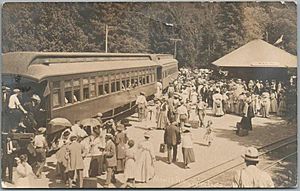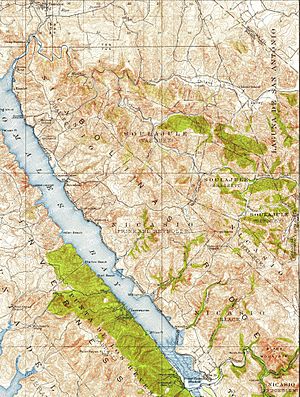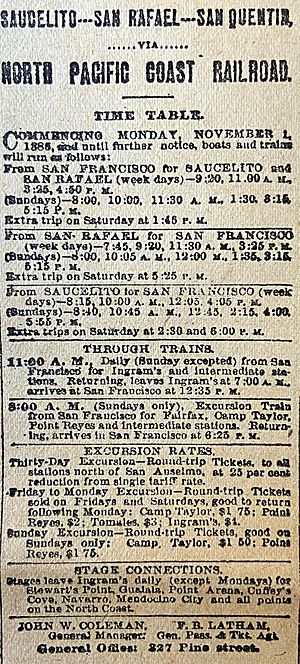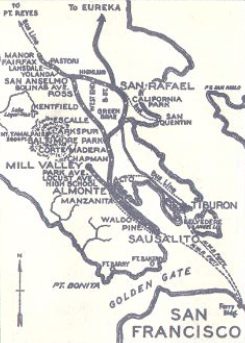North Pacific Coast Railroad facts for kids

Postcard view of a train at Monte Rio station
|
|
| Overview | |
|---|---|
| Headquarters | Sausalito, California |
| Reporting mark | NPC |
| Locale | Marin and Sonoma Counties, California |
| Dates of operation | 1871–1907 |
| Successor | Northwestern Pacific Railroad |
| Technical | |
| Track gauge | 4 ft 8 1⁄2 in (1,435 mm) standard gauge |
| Previous gauge | 3 ft (914 mm) |
The North Pacific Coast Railroad (NPC) was a special kind of train line that carried people and goods. It started in 1874. This railroad used a "narrow-gauge" track, which means the rails were closer together than on most modern trains. The distance between the rails was only 3 feet!
The NPC operated in Marin and Sonoma Counties in northern California. It was important for moving things like redwood lumber, milk, farm products, and passengers. The railroad had almost 93 miles (150 km) of track. It ran from a pier in Sausalito, where passengers could take a ferry to San Francisco. From Sausalito, the trains traveled northwest to places like Duncans Mills and Cazadero.
In 1902, new owners bought the NPC and changed its name to the North Shore Railroad (California) (NSR). They updated parts of the southern section of the line. They made some tracks "standard-gauge" (wider) and added electricity to power some trains. Later, in 1907, the North Shore Railroad became part of the Northwestern Pacific Railroad (NWP). Even after these changes, the tracks north of Point Reyes Station stayed narrow-gauge until they were no longer used in the late 1930s.
Contents
Where Did the Trains Go?
The North Pacific Coast Railroad connected many towns. The distances listed below are from San Francisco, including the ferry ride.
- San Francisco – You would take a ferry to Sausalito.
- Sausalito (6.5 miles)
- San Rafael
- Junction (now known as San Anselmo) (16.5 miles)
- Fairfax (18.3 miles)
- Point Reyes Station (36.4 miles)
- Marshall (45.4 miles)
- Tomales (53.1 miles)
- Valley Ford (59.5 miles)
- Freestone (63.7 miles)
- Occidental (67.6 miles)
- Monte Rio (73.8 miles)
- Duncans Mills (77.1 miles)
- Cazadero (84.3 miles)
After the railroad closed, about 4 miles (6.4 km) of the old track near Samuel P. Taylor State Park were turned into a walking and biking path called the Cross Marin Trail. This trail includes a part in Tocaloma and a bridge over Lagunitas Creek.
How the Railroad Became Electric
The North Shore Railroad (NSR) was run by John Martin and Eugene de Sabla Jr. They were experts in electric trains. They updated the southern 23 miles (37 km) of the line. This allowed electric passenger cars to run alongside the narrow-gauge steam freight trains.
Sometimes, electric trains and steam trains shared the same tracks. These were called "dual-gauge" tracks because they had three rails instead of two, allowing both narrow and standard-gauge trains to use them. In other places, a separate track was built just for the electric cars next to the narrow-gauge line. The line eventually had two tracks from Sausalito to San Anselmo.
A power station was built in Alto, and more electricity was bought from San Rafael. The trains got their power from a "third rail" (which was actually a fourth rail on the dual-gauge sections) that carried 600 volts of electricity. Electric service started to Mill Valley on August 20, 1903, and to San Rafael on October 17, 1903. This was one of the first times a steam railroad in the United States was made electric to run more efficiently, not just to reduce smoke. The methods used here later helped other big train systems, like those in Grand Central Terminal and the subways of New York City. The electric lines grew even more after 1907 as part of the Northwestern Pacific Railroad. However, these electric services stopped on February 28, 1941.
What's Left of the Railroad Today?
All the tracks of the North Pacific Coast Railroad and its successors have been removed. But you can still see parts of the old path. For example, you can find it at Samuel P. Taylor State Park near Fairfax. You can also see it along the shores of Tomales Bay.
Some old train stations are still standing in San Anselmo, Duncans Mills, and Point Reyes Station. In Freestone, a wooden water tank and a freight shed are still there and well-kept.
One of the original NPC steam locomotives, named "Sonoma" (Number 12), has been saved. It looks just like it did in the 1870s and is on display at the California State Railroad Museum in Sacramento. An old flatcar, North Shore 1725, has been fixed up as a picnic car. It is used at the Society for the Preservation of Carter Railroad Resources' Railroad Museum in Fremont. Several other old train cars are in Duncans Mills. One of them, an old passenger coach, was even used as the Point Reyes Station library starting in 1931.
Images for kids
-
Caboose #2 preserved next to the depot at Duncans Mills, California
-
Old railroad path next to Tomales Bay, seen from California State Route 1









